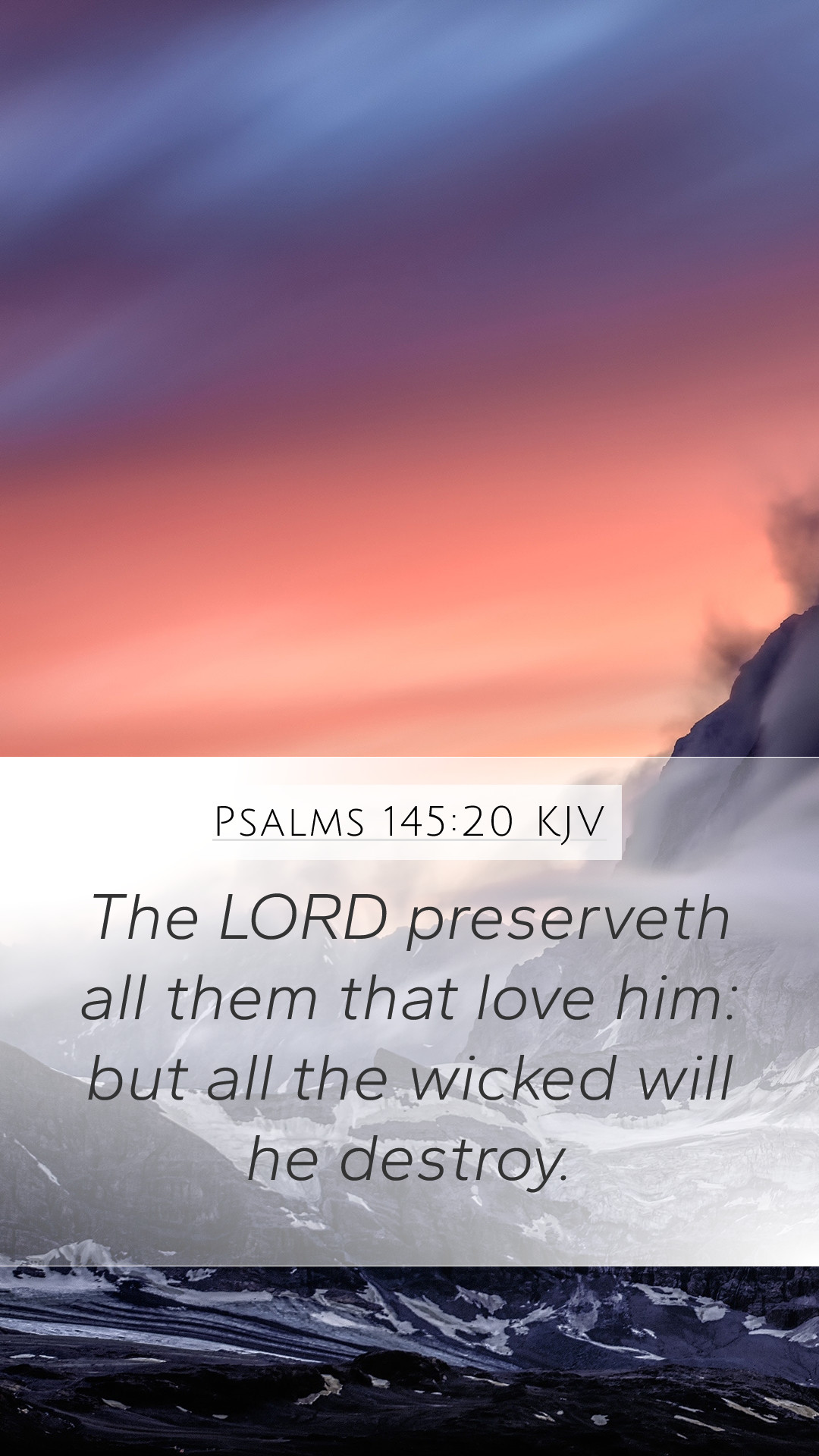Psalms 145:20 - Understanding the Verse
Psalms 145:20 states, "The Lord preserves all who love him, but all the wicked he will destroy." This verse encapsulates a profound truth about God’s nature and His relationship with humanity. The duality presented in this verse—preservation of the faithful versus destruction of the wicked—offers rich opportunities for Bible verse meanings and interpretations.
Verse Analysis
In analyzing Psalms 145:20, we find key insights from prominent public domain commentaries by Matthew Henry, Albert Barnes, and Adam Clarke.
Matthew Henry's Commentary
Matthew Henry emphasizes the love and preservation of God towards those who are faithful to Him. He notes that this love is not only a passive benevolence but an active preservation, suggesting divine intervention in the lives of the faithful. Henry articulates that the verse provides comfort and a sense of safety for believers, as God actively cares for them amidst trials and tribulations.
Albert Barnes' Commentary
Albert Barnes focuses on the dichotomy of the outcomes for the lovers of God versus those who act wickedly. He elucidates that the term "preserves" indicates an ongoing, protective action from God towards His loyal followers. Barnes stresses the severity of the fate awaiting the wicked, reinforcing the notion that their rebellion against God leads to destruction. His reflections draw attention to the moral accountability present in the text, making it clear that God's justice will ultimately prevail.
Adam Clarke's Commentary
Adam Clarke provides a more detailed exegesis of the Hebrew terminology used in this verse. He points out that "love" indicates a deep, covenant relationship with God, characterized by loyalty and obedience. Clarke also highlights that the term "wicked" pertains to those who deliberately oppose God's ways. He describes the destruction of the wicked not merely as a punitive action but as a natural consequence of their choices, emphasizing free will in following God or embarking on a path of rebellion.
Thematic Insights
The themes in Psalms 145:20 resonate beyond its immediate context. This verse reflects the broader biblical principles of divine love, justice, and the contrast between righteousness and wickedness.
- Divine Preservation: The assurance that God commits to sustaining those who love Him reflects the essence of divine grace.
- Judgment on the Wicked: God's response to wickedness unveils His justice, a recurring theme throughout Scripture.
- Human Responsibility: The verse serves as a reminder that individuals have the agency to choose their paths, with consequences tied to those choices.
Cross References
This verse connects with several other scripture passages, enhancing its understanding:
- Romans 8:28: "And we know that in all things God works for the good of those who love him, who have been called according to his purpose."
- Proverbs 10:29: "The way of the Lord is a refuge for the blameless, but it is the ruin of those who do evil."
- Matthew 25:46: "Then they will go away to eternal punishment, but the righteous to eternal life."
Application in Daily Life
Understanding Psalms 145:20 allows believers to apply its teachings in daily life. The verse invites reflection on one's relationship with God and the importance of living in accordance with His will. Here are practical applications:
- Emphasize loving God in personal devotion, worship, and acts of kindness.
- Seek to understand God's justice and mercy as guiding principles in relationships with others.
- Encourage participation in Bible study groups to deepen understanding of Scripture and promote spiritual growth.
Conclusion
In summary, Psalms 145:20 serves as a powerful reminder of God's protective love for His faithful followers and the serious outcomes of wickedness. By synthesizing insights from biblical commentaries, one can appreciate the richness of this verse and its implications for personal faith and communal practice. It challenges us to explore Bible verse meanings, interpretations, and applications to ensure a life aligned with divine purposes. Engaging with this verse through Bible study tools and resources can enhance one’s understanding and commitment to living in a way that reflects God’s love and justice.


